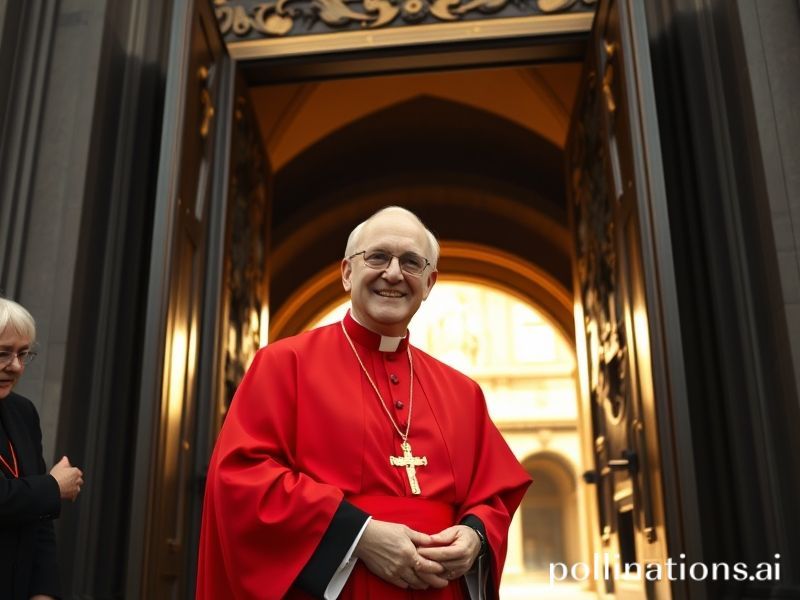Cardinal Dolan: The Vatican’s Cheerful Salesman in a Burning Marketplace of Faith
Cardinal Timothy Dolan, Archbishop of New York, has long been the Catholic Church’s jolliest emissary to cable news—an ecclesiastical game-show host in scarlet, beaming forgiveness at the camera while the Vatican’s brand bleeds market share across five continents. To outsiders, he is the American churchman who can praise Pope Francis on Monday, glad-hand a tax-cutting president on Tuesday, and still make Thursday’s communion breakfast feel like a Rotary Club roast. To Rome, he is the affable firewall against further litigation and empty pews. To the rest of the planet—where Catholicism is booming, stagnating, or being actively recycled into local folklore—Dolan is a walking Rorschach test: either the last buoyant salesman of a 2,000-year-old empire or the smiling embodiment of why that empire keeps settling sexual-abuse cases with the petty-cash jar.
Watch him glide through a press gaggle and you see the Church’s global dilemma in real time. Africa’s pews are so overcrowded that Sunday Mass can feel like a soccer stadium, yet the continent still imports European bishops. Latin America is hemorrhaging believers to Pentecostalism faster than you can say “glossolalia,” but the Curia keeps arguing over which pronouns to avoid. Meanwhile Dolan, product of a St. Louis suburb and seminary kitchens that still serve Jell-O salad, is dispatched to assure the world that the Vatican is “listening.” One half expects him to produce a pair of AirPods as sacramental evidence—though, this being the Church, they would be wired, and only compatible with 2,000-year-old software.
The international significance? Soft-power nostalgia. The United States may no longer baptize its infants, but it still exports prime-time personalities. Dolan’s Irish grin, his belly-laugh at the altar, translate into fundraising livestreams that underwrite clinics in South Sudan or cyclone relief in the Philippines. The calculus is ruthlessly pragmatic: every televised quip keeps donor dollars flowing to missions where the Vatican’s diplomatic passport still counts. It is Christianity as crowd-funding, presided over by a man who looks like he should be handing out raffle tickets for a Ford Fiesta.
Europeans, of course, remain unimpressed. In France, church attendance is so low that priests occasionally outnumber parishioners, giving new meaning to the phrase “intimate gathering.” German bishops, tired of waiting for Rome, are currently beta-testing schism like it’s a Silicon Valley start-up. Dolan’s response is to remind them that unity is “a gift,” the ecclesial equivalent of telling a divorcing couple to think of the children—while slipping them the business card of a good canon lawyer.
Asia presents the opposite problem: too many potential converts, too few clergy. Dolan’s solution has been to bless smartphone apps that locate the nearest valid Mass—because if the Body of Christ can’t be consumed in person, it should at least be geotagged. The irony is delicious: a 16th-century institution that once excommunicated Galileo now relies on GPS satellites to prevent its flock from wandering into a heretical parish by mistake.
Critics note that the cardinal’s bonhomie can sanitize darker ledgers. From Dublin to Santiago, courts keep uncovering cover-ups; bankruptcy filings in U.S. dioceses read like itemized confessions. Dolan insists reforms are underway, yet every new settlement lands like another indulgence invoice sent to the faithful. Abroad, the scandal feels uniquely Western—an export as dubious as fast food—while local churches grapple with dictators, drug cartels, or both. The Vatican’s moral credit rating, one might say, has been downgraded to junk, but Dolan keeps flashing the platinum smile of a man certain the overdraft will clear.
Will the strategy work? Demography laughs last. By 2050, four in five Catholics will live outside Europe and North America. The next pope could be Filipino, Nigerian, or Brazilian. When that happens, Dolan’s Midwestern baritone may sound as antique as Latin at a Tridentine Mass—charming, but mostly decorative. Until then, he remains the Church’s indispensable emcee: part spiritual concierge, part crisis-manager, sprinkling holy water on a bonfire of bad PR and hoping the flames don’t reach the scarlet silk.
In the end, the cardinal’s greatest miracle might be simpler than loaves and fishes: persuading a skeptical planet that an ancient monarchy still has a seat at the global table—right between the last superpower and the next one, smiling, shaking hands, and praying the check never arrives.







